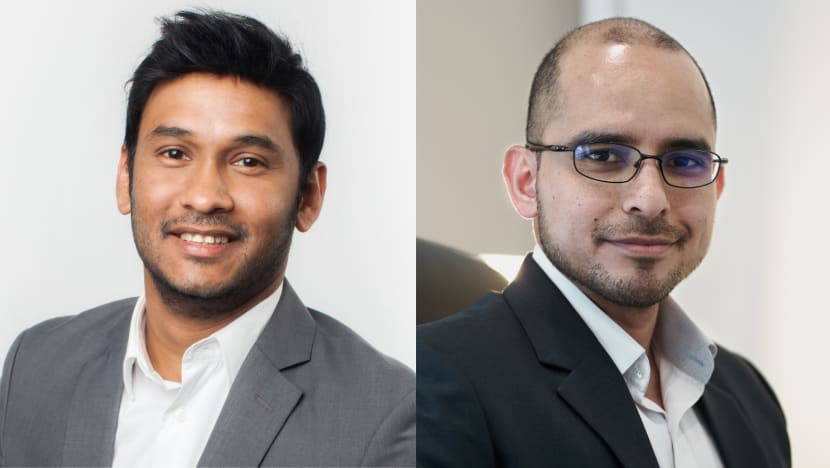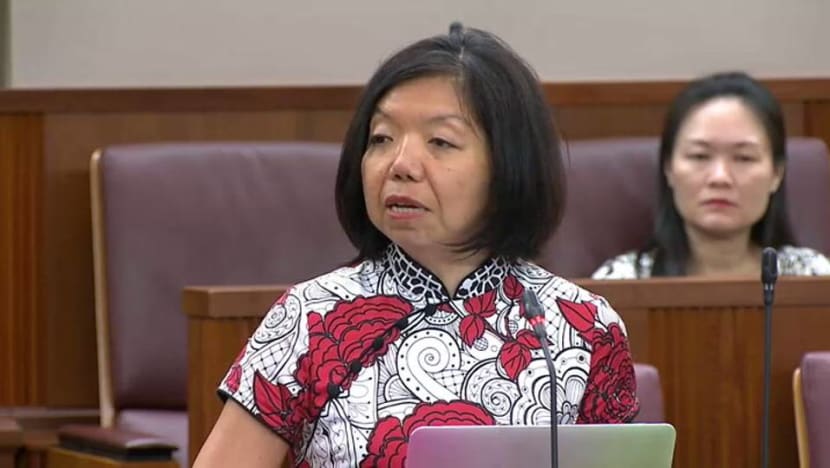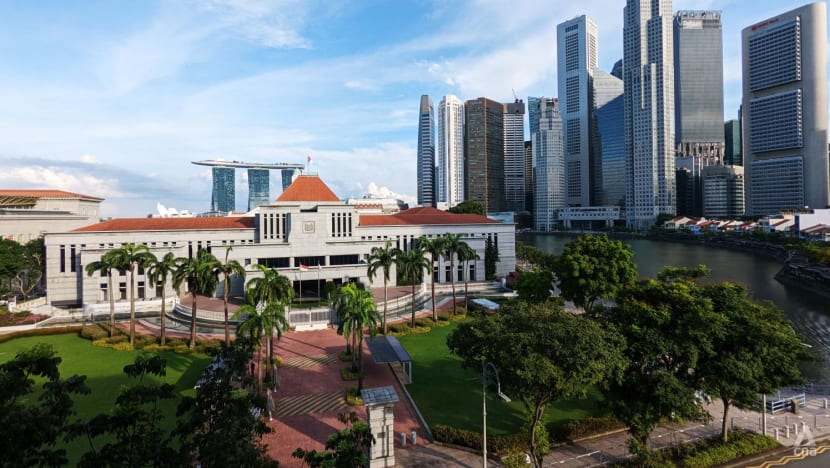Former NMPs raise objections to possibility of members resigning to join political parties and contest GE
No clear reason was given by both Mr Raj Joshua Thomas and Dr Syed Harun Taha Alhabsyi, but the timing of the move has fuelled speculation they would be contesting in the upcoming General Election.

Raj Joshua Thomas (left) and Syed Harun Alhabsyi (right). (Photos: Facebook/Raj Thomas, Parliament of Singapore)

This audio is generated by an AI tool.
SINGAPORE: Former Nominated Members of Parliament (NMPs) have taken issue with the possibility of two newly resigned members going on to join political parties and contest the General Election (GE) this year.
Raj Joshua Thomas and Syed Harun Taha Alhabsyi quit their NMP roles on Friday (Feb 14), fuelling speculation that they could be entering partisan politics.
Should they do so, it could tarnish the premise of non-partisanship which former NMPs said they swore by, during their time in the House.
At least one alumnus of the scheme, however, told CNA that true political neutrality does not exist, and that an NMP's decision to go into politics after his term doesn't necessarily mean he didn't do the job well.
The NMP scheme came into effect in September 1990 to introduce more diverse and non-partisan views in parliament.
In July 1997, the maximum number of NMPs was increased from six to nine, and their term raised from two years to two-and-a-half years in August 2002.
Former member Eugene Tan, who is an Associate Professor of law at the Singapore Management University, told CNA that when he was in office between 2012 and 2014, it “did not at all” cross his mind to enter competitive politics.
“How could one be non-partisan as an NMP if one was harbouring the thought of crossing the aisle to join a political party?”
“Instead, taking up the NMP appointment was very much my own acknowledgement that partisan politics was not for me but that I could still contribute to the legislative process,” he added.
He said that NMPs are free to engage in partisan politics after their stints, and that “it’s their right as citizens”.
“But the public perception, should both men don party whites of the PAP (People's Action Party), is whether the NMP scheme has become a new recruitment ground for the ruling party and may raise legitimate questions in some quarters about the NMP selection and appointment process,” he added.
Mr Thomas and Dr Syed Harun both posted their respective resignation letters to the Speaker of Parliament on their social media accounts.
They did not give a clear reason for quitting. They also did not confirm any plans to be candidates in the upcoming GE, which must be held by November.
Mr Thomas, a lawyer, wrote: “I remain dedicated to serving Singapore and Singaporeans to the best of my abilities. I am contemplating doing so in a different way, in which it would be appropriate for me to resign as an NMP at this time.”
Dr Syed Harun, a psychiatrist, said in his letter: “As I intend to explore (opportunities) for political service, I feel it would be most appropriate to resign from my role as Nominated Member of Parliament.”
When contacted by CNA, both men said they had no further comments beyond their letters to the Speaker and their social media posts.
AGAINST THE “SPIRIT OF THE INSTITUTION”
Former member Nicholas Fang, who was in office between 2012 and 2014, said that there are no rules or laws preventing an NMP from stepping down from their role and contesting in a GE.
“That being said, I think the spirit of the institution is more important than any specific rule or law,” he said.
“In my time as NMP, and indeed in the years after, I have always felt that the independence and non-partisan nature of the role was a critical feature of the NMP scheme as a whole, which precluded me from considering contesting an election as part of a political party,” said the founder and managing director of strategic communications consultancy Black Dot.
He added that while there have been criticisms of the NMP scheme over the years, parliament would be worse-off without non-partisan voices.
“But this assumes that the NMPs would continue to be able to be viewed as independent and non-partisan,” he said.
“Should a sitting NMP quit mid-term and contest in a GE as part of a party, as is the speculation with the latest resignations, this would cast a pall over that aspect of the NMP scheme, and hence a disservice to the institution as a whole.”
NON-PARTISANSHIP HELPED IN ADVOCATING CAUSES
Former member Anthea Ong, who is a social entrepreneur, told CNA that when she was a member between 2018 and 2020, she “took very seriously the crystal clear premise of non-partisanship, which to me meant unconditional inclusion of all”.
The advocate for issues such as mental health, marginalised communities and the environment added that the role gave her “courage and conviction to speak up without fear or favour whether for then-present or future opportunities”.
She spoke about issues that affected the minority and vulnerable groups which “may not have the ears of even the opposition because they might not be helpful to secure votes”, said Ms Ong, who published a book on the NMP scheme.
“In a majoritarian first-past-the-post democracy, getting more votes means politicians are always keeping their eyes on what might give them political advantage with voters,” she added.
She said that for instance, during her term, which was before the repeal of Section 377A, only NMPs spoke up about LGBTQ+ issues.

Agreeing with Ms Ong, Mr Fang said that the non-elected, independent and non-partisan status of NMPs allowed them to contribute in ways that added value to the debates and discussions in the House.
“This status meant they were freed of the pressures on elected MPs, who often have to prioritise representing their constituents and their interests in Parliament,” he said.
For instance, Mr Fang, a former national fencer and triathlete, shared that he represented the sports community, but also shared views on media, international relations, defence and security in his time in office.
“The fact that we were non-elected, independent and non-partisan meant that our views would not be shaded by political leanings or contestations, and we could offer a truly neutral and independent perspective on critical issues of the day,” he said.
DOOR TO ELECTORAL POLITICS SHOULD BE CLOSED TO NMPS: ANALYST
The potential electoral contestation of the NMPs who quit would cast the entire NMP scheme in doubt, said Associate Professor Walid Jumblatt Abdullah from the School of Social Sciences at Nanyang Technological University.
“I am a fan of the NMP scheme… it would be good to have non-partisan individuals in parliament,” he said.
“But if that door is open for non-partisan people to join politics, people subsequently will start to think (if) NMPs are here because they want to join politics, and this is an audition (or) to get some name recognition? So I think it is unwise.”
He also added that “as a matter of principle” anyone who has been or is an NMP should never contest in an election.
“Once you (are) an NMP, you should accept that the door to electoral politics should be closed, and it shouldn’t just be temporary.”

Assoc Prof Walid said that at the very least, there should be a moratorium, or a short period of time, that they should not be allowed to contest.
Assoc Prof Tan, the former NMP, agreed, saying that an NMP should only join competitive politics after one’s term has ended and, ideally, sit out for at least one parliamentary term.
“This ‘cooling off’ period would work well for the aspiring politician and the political party concerned,” he said.
“It removes most, if not all, of the concerns whether an NMP had kept faith, in form and substance, with what it means to be an NMP.”
Independent political observer Felix Tan suggested that after an NMP term ends, they should at least sit out the next GE before contesting the following one if they wish to do so.
"That would certainly provide them enough time to ensure that they were not using the NMP scheme for any political gain," he added.
"NON-PARTISANSHIP IS A JOB DESCRIPTION, NOT REFLECTION OF VALUES"
Meanwhile, former NMP Calvin Cheng, who was in office between 2009 and 2011, disagreed that an NMP should not run for political office.
Mr Cheng, who is a businessman, said that an NMP's role in parliament should not be confused with their personal values.
“During their time in parliament, NMPs have to discharge their duties as non-partisan, independent parliamentarians - this is a job description,” he said.
"It cannot possibly be the description of a person’s values or psychological makeup.”
He added that no one is “truly neutral or non-partisan”, and that everyone has their own political biases.
“When NMPs are asked to be non-partisan in parliament, it merely means two things: One, (that) they have to put aside their own political bias and vote independently (and) second, they are not under any political party whip,” he said.
“If an NMP then chooses to run for political office after, it doesn’t mean that when he was an NMP, he did not discharge his duties faithfully.”
However, Dr Tan, the observer, said that while everyone has political leanings, this is different from "intentionally joining a political party when given the advantage of being an NMP".
"This still calls into question one's integrity and whether they have used the NMP scheme as a stepping stone to give them any advantage," he reiterated.
COULD THEY RUN AS INDEPENDENTS?
Theoretically, the resigned NMPs could also run in an election as independent candidates.
This is not unprecedented. Former NMP Chia Shi Teck, who was in parliament between 1992 and 1994, stood as an independent candidate in the Chua Chu Kang single member constituency in the 1997 GE, garnering 14 per cent of the vote.
Dr Tan said that by running as independent candidates, the individual would "ensure that they keep their integrity as being non-partisan, which was why they first joined as NMPs".
However, he thinks this is unlikely.
"Realistically speaking, in Singapore, without any party support in any form, they will not likely win sufficient votes," he said.
Agreeing, Assoc Prof Tan said the coordinated resignations of both NMPs point towards "something that has been in the works for some time".
"The choices made by both men to vacate their NMP seats probably would not have been taken without the firm assurance of a larger platform to serve," he said.
















